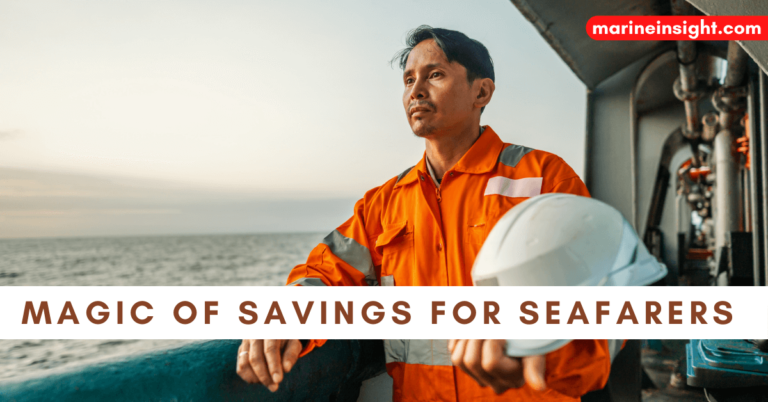This is the third article in the personal financial planning for seafarers series by the very experienced Chief Engineer Rajeeve Kaushik. You can read the previous articles of the series here – Importance of Financial Planning for Seafarers & 10 Common Financial Mistakes Seafarers Make
Savings are an important part of Human Nature. In fact even animals and birds have been known to save food for “A Rainy Day”. If you are an engineer on board ships you would have realised the importance of extracting the last bit of energy from every drop of fuel, also called the “saving of fuel.”
In my second article 10 COMMON FINANCIAL MISTAKES SEAFARERS MAKE, you would have studied a savings table and discovered that even a small amount saved by seafarers early in life and continued for a long time has the ability to produce mind boggling returns. However this is no magic but simply mathematics which comes into play when you start putting yourself under “discipline saving.”
When it comes to financial planning, there are broadly two types of savings that every human being practices even without knowing- Direct or Active Savings and Indirect or Passive savings.
This you may not find in any Economics text book, but since I have elevated savings to an important action, we will treat it as a philosophy.
Let’s get a bit deeper!
DIRECT or ACTIVE Savings: are those that a person does by putting a part of his earnings aside; whether in a bank, piggy bank or under his mattress.
INDIRECT or PASSIVE Savings: in my opinion happen when we make conscious alternatives to our expenditures or defer certain expenditure to a future date. e.g. If you decide to buy a lesser priced (I will not say cheaper as it does not sound good) mobile or a car. You save some money which is yours, which otherwise would not have been with you.
Another example is that you decide to pay off your overdue credit card bill by withdrawing cash from your bank account which is earning lesser interest than what you are paying for your credit card outstanding.
Both the above savings will help you boost, what I call your CORPUS.
CORPUS: Since your pay check at any given time or at any rank will always be fixed and limited, this corpus is what we will seek to create and boost by various methods in future. It is this corpus that you will aim to maximise by adopting healthy saving habits and healthy spending habits. This corpus will consist of Bank account, Fixed Deposits, Post Office schemes, Shares (if you will choose to invest in them), Mutual funds (which you must) etc.
The insurances that you will adopt for health, accident, House and life will not come into this Corpus directly because they are only for risk coverage. However, since they will enable you to cut down on unforeseen expenditure such as illness, accident, Fire/theft at home or other similar emergencies. You can consider this to be an enhancement on your corpus.
Whenever in future you calculate your complete net worth you should understand that it is same as what we are calling corpus.
Having said all that now comes the most difficult part of actually saving in an optimal manner!

Your salary from ships is directed to your bank account via the monthly allotment route. First from a legal standpoint please ensure that you have correct type of bank account as per your country’s rules.
e.g. In India the expatriates (called NRIs- those who stay for less than 182 days in India) are required to have NRE savings accounts. This is a specific account for NRIs where funds should be parked for only short periods of time, since the rate of interest is very low. It is advised to keep funds for about 3 months of home expenses in NRE accounts. Remaining money if you do not need for more than 1 year, can be shifted to NRE FIXED deposits. I will again reiterate that if you need this money within 1 year, then do NOT put it in Fixed Deposits or term deposits, as you will not earn any interest even if you break or liquidate your deposit just 1 day before the 1 year period.
These rules are not made by banks, but by RBI (Reserve Bank of India), so do not be misguided by the bank if it advises you otherwise.
FCNR (B) deposits are also fixed deposits, but those maintained in major foreign currencies, in India. To open these accounts you have to give instructions to your bank by filling a form, before or with the remittance which comes to the bank. Since for seafarers the salary is remitted by the ship owner/operator, and the date is not fixed, it is better to leave some pre-signed forms with the bank manager/relationship manager/relatives at home. This type of deposits should be opened if it is expected that the home currency (Indian Rupee in this case) will depreciate, or if you feel that you will need foreign currency in future for the purpose of your exams abroad or some other purpose. Since the minimum period for these deposits in India is also 1 year, the deposit should be started only if you do not need this money for more than a year. Of course if there is a marked depreciation in Rupee, you can liquidate the deposit to benefit from the higher exchange rate. Such benefits of course, more out of chance than design, e.g.
The sharp depreciation of the Russian Rouble may have benefitted those who held a bank account in USD. But how can we make our monthly salary work harder for us than the minimal interest rate offered by traditional bank deposits, while still maintaining the flexibility to access our funds when needed?
Introducing the concept of Mutual Funds, which are investment vehicles managed by Asset Management Companies (AMCs). There are two main types of Mutual Funds: Equity and Debt (Fixed Income Funds). In India, Mutual Funds are well regulated by the government body SEBI.
Liquid Funds, a category of Debt Funds, invest in government securities and corporate loans. These funds are denominated in the local currency, providing a safe and convenient investment option. The funds grow daily at a rate slightly higher than traditional bank rates, and withdrawals can be made easily through redemption forms or online transactions.
One of the key benefits of Liquid Funds is the absence of penalties for withdrawals, unlike NRE Fixed Deposits. Additionally, the tax deducted for NRIs can be reclaimed by filing an Income Tax return. This flexible investment option allows for steady growth of funds while providing easy access to savings.
For new investors, Mutual Funds may seem daunting at first, but the process becomes simpler with experience. It’s essential to save consistently and explore avenues for efficient investments that offer higher returns, tax efficiency, and minimal risk. By asking the right questions and seeking written assurances from financial advisors, investors can make informed decisions about their money.
As we approach the end of 2015, it’s crucial to review financial goals and make a plan for smart money management. By prioritizing efficient savings and disciplined investments, seafarers can secure their financial future and make their hard-earned money work for them. Please provide the contents that you would like me to rewrite.

